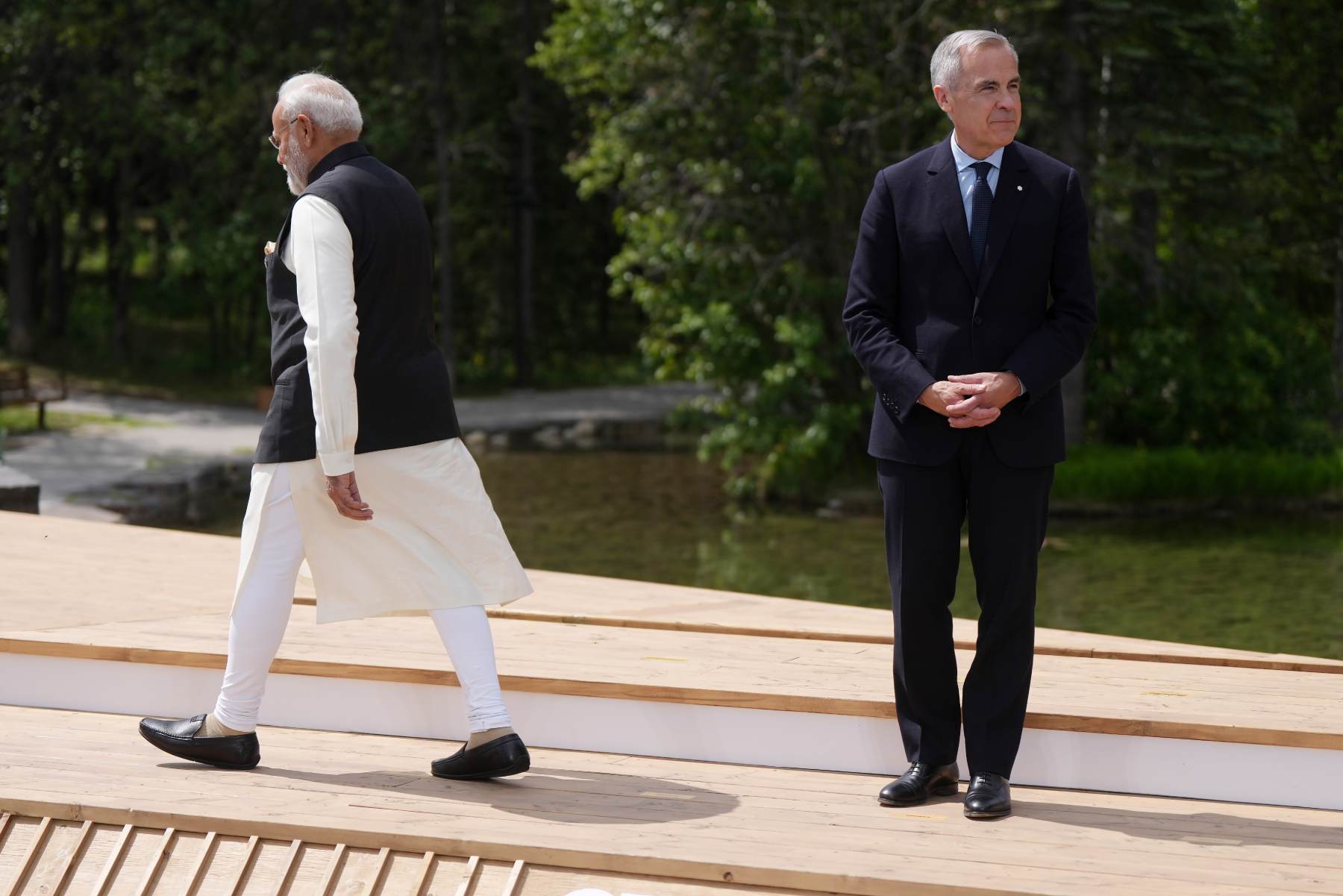World
Canada and India Reignite Diplomatic Talks Amid Tensions

The diplomatic relationship between Canada and India has entered a tentative phase of reconciliation following a high-profile meeting between Canadian Prime Minister Mark Carney and Indian Prime Minister Narendra Modi at the G7 summit in Alberta in June 2024. This meeting came after months of escalating tensions, particularly surrounding the allegations of Indian government involvement in the murder of Canadian Sikh leader Hardeep Singh Nijjar.
As relations between the two nations hit a low point in 2023, when former Prime Minister Justin Trudeau accused India of orchestrating Nijjar’s assassination, the summit’s agenda was overshadowed by the need for dialogue. Carney’s invitation to Modi raised eyebrows, considering the ongoing investigations into Nijjar’s murder and the implications for Canada’s approach to international relations. New Delhi accepted the invitation, signaling a willingness to engage despite the unresolved concerns.
During the summit, both leaders engaged in diplomatic gestures, including agreements to restore high commissioners in their respective capitals and to resume trade discussions. However, Carney avoided addressing the Nijjar case directly, citing the need for caution regarding ongoing judicial processes. Modi, on the other hand, framed their discussions around shared democratic values and economic cooperation, though he did not offer concrete commitments to address Canada’s concerns about transnational crime.
Underlying Tensions and Economic Realities
The apparent diplomatic thaw masks deeper issues that remain unresolved. The Canadian Security Intelligence Service (CSIS) released a report shortly after the summit, highlighting systematic efforts by India to influence Canadian communities and politics. The report indicates that India has been involved in transnational repression against dissidents, which continues to strain relations.
Despite the positive rhetoric, the split reactions within Canada reflect a complex political landscape. The World Sikh Organization condemned the meeting as an insult to the Sikh community, while some government officials defended the move as necessary for economic diversification in a changing global landscape. Carney’s approach appears to be driven by economic pragmatism, recognizing India as a vital player in global supply chains and a growing market.
While Canada has high hopes for increased trade with India—beyond the mere $30.9 billion reached in 2024—challenges persist. Regulatory barriers and fierce competition complicate the landscape for Canadian businesses. Furthermore, the call for renewed trade talks contrasts sharply with the reality of ongoing political disputes, which have historically stalled negotiations for free trade agreements.
The Future of Canada-India Relations
The diplomatic engagement between Carney and Modi contrasts sharply with the previous interactions between Modi and Trudeau, which were marked by tension and miscommunication. Modi’s willingness to engage with Carney suggests a shift in strategy, but both leaders must navigate their respective domestic political landscapes carefully. In Canada, Carney’s minority government must contend with the influence of Sikh voters in key regions, while Modi’s party faces challenges in addressing the concerns of minority communities.
The CSIS report underscores the precarious nature of this relationship, indicating that India is one of the main perpetrators of foreign interference in Canada. This ongoing issue complicates any potential for lasting resolution, indicating that the current diplomatic gestures may only provide a temporary reprieve rather than a sustainable solution.
As both nations seek to strengthen economic ties, the risks of future crises loom large. The next escalation, whether due to another incident involving transnational crime or political pressures, could reignite tensions. Without a concerted effort to address the underlying issues, including allegations of interference and the complexities surrounding the Khalistan movement, the fragile peace achieved at the G7 summit may quickly unravel.
In summary, while the recent meeting between Carney and Modi represents a significant step in rekindling diplomatic relations, the fundamental challenges remain unaddressed. Both countries must confront the realities of their complex relationship, recognizing that genuine reconciliation requires more than economic expediency; it demands a commitment to resolving the issues that have historically divided them.
-

 Science2 months ago
Science2 months agoToyoake City Proposes Daily Two-Hour Smartphone Use Limit
-

 Health2 months ago
Health2 months agoB.C. Review Reveals Urgent Need for Rare-Disease Drug Reforms
-

 Top Stories2 months ago
Top Stories2 months agoPedestrian Fatally Injured in Esquimalt Collision on August 14
-

 Technology2 months ago
Technology2 months agoDark Adventure Game “Bye Sweet Carole” Set for October Release
-

 World2 months ago
World2 months agoJimmy Lai’s Defense Challenges Charges Under National Security Law
-

 Technology2 months ago
Technology2 months agoKonami Revives Iconic Metal Gear Solid Delta Ahead of Release
-

 Technology2 months ago
Technology2 months agoSnapmaker U1 Color 3D Printer Redefines Speed and Sustainability
-

 Technology2 months ago
Technology2 months agoAION Folding Knife: Redefining EDC Design with Premium Materials
-

 Business2 months ago
Business2 months agoGordon Murray Automotive Unveils S1 LM and Le Mans GTR at Monterey
-

 Technology2 months ago
Technology2 months agoSolve Today’s Wordle Challenge: Hints and Answer for August 19
-

 Lifestyle2 months ago
Lifestyle2 months agoVictoria’s Pop-Up Shop Shines Light on B.C.’s Wolf Cull
-

 Technology2 months ago
Technology2 months agoApple Expands Self-Service Repair Program to Canada








